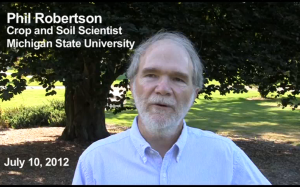
Screenshot from Yale Forum on Climate Change and the Media.
The increasing unpredictability of extreme weather makes it hard to adapt U.S. crops to climate change.
So says, Phil Robertson, a crop and soil scientist from Michigan State University, in a recent video released by the Yale Forum on Climate Change and the Media.
Adjusting planting strategies and adapting new crop genetics are straightforward approaches farmers and crop scientists can take to respond to new climate conditions, he said.
The variability of extreme weather complicates these tactics, though.
“Extreme events, with the longer heat waves, with seasonal droughts, which are much more difficult to predict, and much more important in their effects on crops will be, I think, probably the hardest aspect of climate change to anticipate and adapt to,” Robertson said in the video.
To illustrate the climate changes farmers may have to adjust to, the video uses predictions from “Global Climate Change Impacts in the United States,” a report put together by the U.S. Global Change Research Program.
The report predicts that Illinois, “the heart of the grain belt” in the U.S., will have growing conditions similar to south Texas by the end of the century.
The fact remains that the record high and low for the state were set in the 30’s.
Um, Tom. Were you awake in March? Have a look at this:
http://www.absolutemichigan.com/dig/michigan/talkin-bout-a-heatwave/
A spring heat wave like no other in U.S. and Canadian history peaked in intensity yesterday, during its tenth day. Since record keeping began in the late 1800s, there have never been so many temperature records broken for spring warmth in a one-week period – and the margins by which some of the records were broken yesterday were truly astonishing. Wunderground’s weather historian, Christopher C. Burt, commented to me yesterday, “it’s almost like science fiction at this point.”
…Pellston, Michigan in the Northern Lower Peninsula is called “Michigan’s Icebox”, since it frequently records the coldest temperatures in the state, and in the entire nation. But the past five days, Pellston has set five consecutive records for hottest March day. Yesterday’s 85° reading broke the previous record for the date (53° in 2007) by a ridiculous 32°, and was an absurd 48°F above average.
The low temperature at Marquette, Michigan was 52° yesterday, which was 3° warmer than the previous record high for the date!
Much more there. Hard to dispute. One thing that was noted is that:
Chicago and Rockford have now both broken high temperature records 5 days in a row. There is even the potential they could tie or break record highs for up to an unbelievable 8 days in a row depending on how warm temperatures get Monday through Wednesday. It is extraordinarily rare for climate locations with 100+ year long periods of records to break records day after day after day.
Your reference of 2 days in the 1930s is disingenuous at best.
It is unlikely that global warming will cause increased extreme weather. If the world warms due to increasing greenhouse gas emissions, temperatures at high latitudes are forecast to rise most, reducing the difference between arctic and tropical temperatures. Since this differential drives weather, we should see less extremes in weather in a warmer world.
It is also a mistake to blame human activities for current weather extremes. The August 29, 2011 Nongovernmental International Panel on Climate Change report (NIPCC — see http://www.nipccreport.com) concluded “…the data reveal there have not been any significant warming-induced increases in extreme weather events.” The report showed that this was the case whether the phenomenon was precipitation, floods, drought, storms, hurricanes, fire, or other weather-related events. NIPCC author, Dr. Madhav Khandekar, demonstrated that extreme weather events are now occurring with about the same frequency as they did during 1945-1977 cooling period.
The National Climate Data Center Web site reveals that, aside from a record snow fall in 1985, no state-wide extreme weather records have been set in Michigan for 64 years. Here are when the records were set (*):
Highest temperature: 1936
Lowest temperature: 1934
Most precipitation in 24 hours: 1914
Most snowfall in 24 hours: 1985
Max snow depth: 1948
Sincerely,
Tom Harris
Executive Director
International Climate Science Coalition (ICSC)
http://www.climatescienceinternational.org